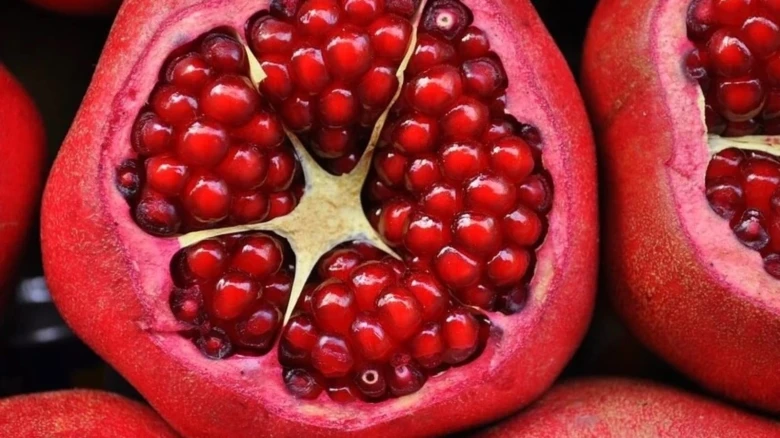Regional

To get the most advantages, consume a whole fruit that is high in fibre, chew the seeds, and swallow the fruit whole. Avoid drinking it as juice.
Digital Desk: Possessing a
pomegranate as a fruit looks to be quite difficult. Isolating the ruby-red
crystal-like seeds from its hardshell coating could seem a little tiresome. But
because it is so dense in nutrients, including flavonoids and antioxidants, it
is more than a superfood and treats a variety of health issues. It should be
utilized as the go-to "food medication" that it is.
According to Ritika
Samaddar, Regional Head of Max Healthcare's Department of Clinical Nutrition
and Dietetics, "pomegranates have so many beneficial properties that they
can help you maintain a healthy lifestyle as well as revive your body from
various illnesses. It is beneficial for diabetics, helpful for the heart and
brain, loaded with vitamin A and C, and abundant in antioxidants. In fact, it
is a fruit that is great for snacking and can satisfy your between-meal
appetite. To get the most advantages, consume a whole fruit that is high in
fibre, chew the seeds, and swallow the fruit whole. Avoid drinking it as juice.
How does it help in heart
health?
The level of antioxidants is
determined by its creamy white to deep red colorants. Pomegranate juice
contains antioxidants, particularly polyphenols, in substantially higher
quantities than many fruit juices. It reduces low-density lipoprotein (LDL),
or bad cholesterol, and has roughly three times as many antioxidants as green
tea or red wine, according to Dr. Varsha Gorey, senior clinical dietician and head
of dietetics at Apollo Hospitals in Navi Mumbai.
Additionally, polyphenols
support blood flow and fight inflammation, ageing, and other conditions.
"When you cut a pomegranate open, you'll find red, juiced-up arils with a
sweet-tart flavour. Each aril contains a tiny seed. Pomegranates have a
glycaemic index (GI) of 53 and 83 calories, 13 grams of sugar, and are high
in fibre. It is also rich in potassium, folate, and vitamin K. The ability to
inhibit triglycerides that raise your risk of heart disease is the best aspect,
though.
A pomegranate prevents blockages and even abdominal fat by fighting
them before they may be deposited in the body. Pomegranate seed oil was shown
to dramatically cut triglycerides and raise the HDL-LDL ratio when taken daily
for four weeks in a trial of 51 individuals with high cholesterol and
triglycerides. Its potassium and magnesium content aids in reducing blood
pressure and hypertension (BP). It’s vital fats promote gut health by assisting
with digestion and relieving constipation. A 2017 review in Pharmacological
Research of eight clinical trials showed that pomegranate juice reduced
systolic and diastolic blood pressure, thereby sealing its place as a
heart-healthy food.
How does it help in
diabetes?
Consuming the fruit improves
insulin regulation since it is a source of insoluble dietary fibres, according
to Samaddar. Over the last decade, much research has linked pomegranate with
Type 2 diabetes prevention and therapy. Pomegranates benefit Type 2 diabetics
by lowering their levels of oxidative stress and lipid peroxidation, according
to a study. It demonstrated how pomegranate peel extract, methanolic seed
extract, and punicic acid dramatically lowered fasting blood glucose levels.
Punicalagin, ellagic, gallic, oleanolic, ursolic, and uallic acids and tannins
are well-known components in pomegranates that have been linked to the
regulation of diabetes. 2014 research on diabetics found that daily pomegranate
juice consumption reduced inflammatory markers by roughly 30%.
How are pomegranate
anti-inflammatory and fights chronic diseases, cancer, osteoarthritis, and
rheumatoid arthritis?
Studies in 2013 and 2014
have shown that pomegranate extract can reduce inflammatory activity in the
digestive tract, breast cancer, and colon cancer cells. Some laboratory
studies have shown that pomegranate extracts can slow down cancer cell
reproduction and can even cause apoptosis (cell death) in cancer cells.
“Studies have found pomegranate juice to impact concentrations of C-reactive
protein and IL-6 biomarkers in patients with inflammatory diseases.
Pomegranates are anti-bacterial and anti-fungal and are good for oral cavity
health,” says Dr. Gorey.
How pomegranates boost
endurance
The fruit can increase
energy levels because it is high in dietary nitrates. Pomegranate extract
administered prior to exercise dramatically improved blood flow and postponed
exhaustion, according to a 2014 study of 19 athletes.
The fruit is incredibly
beneficial to an ageing population. A study published in Nature Metabolism
revealed that the pomegranate ingredient urolithin A enhances the efficiency of
mitochondria, the energy centres of cells.
When and how should I have
pomegranates?
Fortunately, Indians have
long consumed pomegranates as a fruit offering, a garnish for food, and juice. It's the perfect snack for mid-morning and mid-evening periods when
you're feeling peckish. You can add them to smoothies and salad bowls as a
garnish. Take a shot at it completely. According to Dr. Gorey, juice should
only be provided to elderly persons or sick people who have no appetite.
Leave A Comment